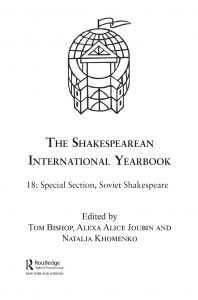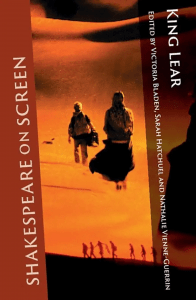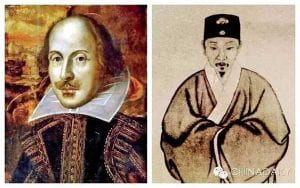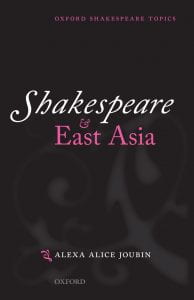 When AI goes to theater with humans, it changes the dynamics of the social space. This article examines a case of audiences using an AI app on their phones to translate a sign language performance. Whom does the screen interface serve, and how do artificial intelligence tools affect theatrical publics across both the playing space and the playgoing space? Screens are a site where cultural and performative meanings are generated and negotiated.
When AI goes to theater with humans, it changes the dynamics of the social space. This article examines a case of audiences using an AI app on their phones to translate a sign language performance. Whom does the screen interface serve, and how do artificial intelligence tools affect theatrical publics across both the playing space and the playgoing space? Screens are a site where cultural and performative meanings are generated and negotiated.
Tag: global Shakespeare
When Films Allude to Shakespeare …
 Shakespeare’s plays and motifs have been cited and appropriated on screen since motion pictures were invented in 1893. Allusions to Shakespeare haunt our contemporary culture in a myriad of ways, whether through brief references or sustained intertextual engagements. ...continue reading "When Films Allude to Shakespeare …"
Shakespeare’s plays and motifs have been cited and appropriated on screen since motion pictures were invented in 1893. Allusions to Shakespeare haunt our contemporary culture in a myriad of ways, whether through brief references or sustained intertextual engagements. ...continue reading "When Films Allude to Shakespeare …"
The Value of Global Shakespeare
Shakespeare and East Asia (2021) explores distinctive themes in post-1950s Asian-themed performances and adaptations of Shakespeare. In this Snapshot, former Fulbright Scholar Alexa Alice Joubin discusses the book and the importance of wider research into Global Shakespeares. ...continue reading "The Value of Global Shakespeare"
Soviet Shakespeares

Due to Karl Marx’s frequent references in his political treatises, Shakespeare held a significant place in a number of communist and other left-authoritarian countries, including China and the USSR. And although there were themes in Shakespeare that turned out to be inconvenient for communist ideology, other Shakespearean plays were put into service. In Part I of this volume of the Yearbook, the special section of chapters explores the vicissitudes of artistic and political uses of Shakespeare in Soviet culture and ideology after the October Revolution in 1917, including in some of the continuing resonances of those uses since the collapse of the Soviet Union. And while the real and perceived resistance to prevailing ideologies of Soviet directors has tended to capture recent critical attention, there is a wide range of Soviet and post-Soviet interpretations of Shakespeare. ...continue reading "Soviet Shakespeares"
Ethics of Performative Citations of Shakespeare
 Global Shakespeare can be studied through two interrelated concepts: performance as an act of citation and the ethics of citation. Appropriating the classics carries strong ethical implications. A crucial, ethical component of appropriation is one’s willingness to listen to and be subjected to the demands of others. These metaphorical citations create moments of self and mutual recognition. Seeing the others within is the first step toward seeing oneself in others’ eyes. The act of citation is founded upon the premise of one’s subjectivity, the subject who speaks, and the other’s voice that one is channeling, misrepresenting, or appropriating. ...continue reading "Ethics of Performative Citations of Shakespeare"
Global Shakespeare can be studied through two interrelated concepts: performance as an act of citation and the ethics of citation. Appropriating the classics carries strong ethical implications. A crucial, ethical component of appropriation is one’s willingness to listen to and be subjected to the demands of others. These metaphorical citations create moments of self and mutual recognition. Seeing the others within is the first step toward seeing oneself in others’ eyes. The act of citation is founded upon the premise of one’s subjectivity, the subject who speaks, and the other’s voice that one is channeling, misrepresenting, or appropriating. ...continue reading "Ethics of Performative Citations of Shakespeare"
Teaching King Lear in a Global Context
 How might we engage with the "essence" of King Lear, or "Learness," in a networked culture? Juxtaposing the clips of the division-of-the-kingdom scene from different films allows us to reexamine our perceived ethical burden to explain Lear’s problems away. The scene in Peter Brook’s 1971 film is dominated by close-ups of Lear and other characters, framing Paul Scofield’s Lear as a solemn statue. Peter Brook’s 1962 RSC production and subsequent 1971 film of King Lear engages with the theme of ecocriticism through an apocalyptic mise-en-scène.
How might we engage with the "essence" of King Lear, or "Learness," in a networked culture? Juxtaposing the clips of the division-of-the-kingdom scene from different films allows us to reexamine our perceived ethical burden to explain Lear’s problems away. The scene in Peter Brook’s 1971 film is dominated by close-ups of Lear and other characters, framing Paul Scofield’s Lear as a solemn statue. Peter Brook’s 1962 RSC production and subsequent 1971 film of King Lear engages with the theme of ecocriticism through an apocalyptic mise-en-scène.
In contrast to Laurence Olivier’s Lear in Elliott’s 1983 film, who laughs off Cordelia’s initial response, Scofield’s Lear speaks methodically and remains stern throughout the scene, which ends with him calmly banishing Cordelia. Cordelia’s aside is cut, thereby diminishing the weight of a potentially revelatory moment as well as Cordelia’s self-discovery.
...continue reading "Teaching King Lear in a Global Context"
Performing Commemoration: The Cultural Politics of Locating Tang Xianzu and Shakespeare
 Cultural memory is actively constructed through embodied and political performances. Tang Xianzu and William Shakespeare, two “national poets” of unequal global stature, have recently become vehicles for British and Chinese cultural diplomacy and exchange during their quatercentenary in 2016. The culture of commemoration is a key factor in Tang’s and Shakespeare’s positions within world theatre. Performances of commemoration take a wide range of approaches from grass-root events to government-sponsored festivals. With a comparative scope that explores the afterlives of the two dramatists, this cluster of essays examines commemorative practices, the dynamics of artistic fame, comparability of different dramatic traditions, and transformations of performance styles in socio-historical contexts. ...continue reading "Performing Commemoration: The Cultural Politics of Locating Tang Xianzu and Shakespeare"
Cultural memory is actively constructed through embodied and political performances. Tang Xianzu and William Shakespeare, two “national poets” of unequal global stature, have recently become vehicles for British and Chinese cultural diplomacy and exchange during their quatercentenary in 2016. The culture of commemoration is a key factor in Tang’s and Shakespeare’s positions within world theatre. Performances of commemoration take a wide range of approaches from grass-root events to government-sponsored festivals. With a comparative scope that explores the afterlives of the two dramatists, this cluster of essays examines commemorative practices, the dynamics of artistic fame, comparability of different dramatic traditions, and transformations of performance styles in socio-historical contexts. ...continue reading "Performing Commemoration: The Cultural Politics of Locating Tang Xianzu and Shakespeare"
Ophelia Unbound

How does Ophelia become “unbound” through supralinguistic structures of spectacle and music especially in a transgender performance? With case studies of three Hamlet films: Haider (India, 2004), The King and the Clown (South Korea, 2005), and Prince of the Himalayas (Tibet, 2006), this article examines theatrical and cinematic presentations of Ophelia's double bind as an icon and a victim. ...continue reading "Ophelia Unbound"
Ethics of Global Shakespeare

The dialogues between Shakespeare and his modern interlocutors are driven by ethical claims and the use of Shakespeare for political expediency. While artists and critics alike gravitate toward inspirational narratives, there is the risk of selling out on art’s impact on social justice. Advertising trends—or cultural paratexts around performances—are one area where artists’ ethical claims are sometimes countered by marketing shortcuts especially in relation to presentations of racial and gender diversity. In some cases, what appear to be multiethnic performances based on the casts turn out to be aesthetically incoherent, while in other cases queerness is framed as a defining feature when a production does not actively engage with gender diversity.
Here are highlights of my paper delivered at the Shakespeare Society of South Africa conference on "Shakespeare and Social Justice" in Fugard Theatre, Cape Town, May 16-18, 2019. ...continue reading "Ethics of Global Shakespeare"
Local and Global Myths in Shakespearean Performance
Local and Global Myths in Shakespearean Performance
Edited by Aneta Mancewicz and Alexa Alice Joubin
In the Reproducing Shakespeare series (ed. Tom Cartelli and Katherine Rowe)
Palgrave Macmillan, 2018
“Contradictory myths are the foundation to many conversations about Shakespeare today. We can better grasp the significance of globalShakespeare by understanding the cultural logic of the production and consumption of these myths—often articulated in the form of journalistic adoration of universal aesthetics.”
Full text of the Introduction: researchgate.net/profile/Alexa_Joubin
...continue reading "Local and Global Myths in Shakespearean Performance"



